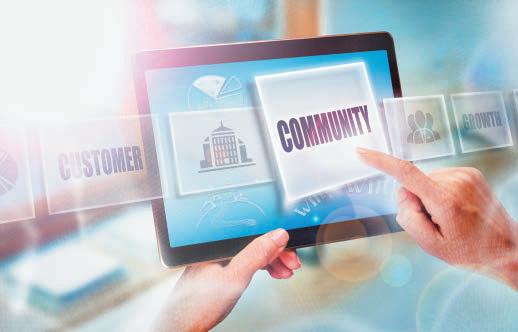
3 minute read
Taking a Stand is Good for Business
Corporate social responsibility has become a key differentiator that can set your company and its products apart from rivals with similar offerings.
By Catherine Hernandez-Blades
In today’s business world, where you stand is almost as important as what you sell. Social responsibility is serious business. It is a powerful declaration of what a company believes in—a moral stake in the ground as well as the standard by which it is judged.
And who is doing the judging? Quite simply, consumers who want to do business with organizations that are committed to doing good. A growing number use their dollars to support products and services that support their personal beliefs and ideals.
For financial advisors and insurers, the question is not if they should adopt a socially responsible stance; it is how and when. After all, in the era of social media, information about your corporate social responsibility (CSR) activities—or lack thereof—is just a click away.
The value of social responsibility
Whether your company is large, small, or in between, there is value in supporting a cause, giving back to a community and doing good. Studies show that CSR has a direct effect on consumer goodwill and purchasing habits, as well as on workforce behavior:
• Eighty-seven percent of consumers will purchase a product because a company advocated for an issue they care about. Conversely, 76 percent will refuse to purchase a company’s products or services if they learn it supported an issue contrary to their beliefs.1
• The 2020 Workplace Report found that 80 percent of 13- to 25-year-olds, which includes students about to enter the U.S. workplace, want to work for a company that cares about how it contributes to society. More than half would not work for an irresponsible corporation.2
• The 2015 Community Involvement Study revealed that 89 percent of companies have found a positive correlation between employee volunteerism and increased engagement at work.3 These findings are backed by research from Reputation Institute, which found the concept of philanthropy tying back to brand identity is consistent among the world’s top companies. Its 2018 Corporate Reputation Survey revealed that the companies with the strongest consumer reputations regularly demonstrate delivery of brand promises through corporate citizenship.5 The emotional connections consumers develop with these brands drive supportive behavior, including the willingness to purchase a company’s products, recommend the brand, invest in the business or even work for the company.
Big wins from small steps
If you work for a large company, odds are that its size, influence, and resources will make it easier to establish, monitor and publicize any CSR efforts. But smaller companies with more limited resources can also develop worthy CSR programs. The key is establishing a firm foundation and deciding how much to give, either through donations or sweat equity.
Do not get overwhelmed by the many giving options out there. Choose those that align with your values as well as those of your customers. Perhaps that means teaming with a national cause such as the American Red Cross—or in Aflac’s case, Habitat for Humanity, Children’s Miracle Network Hospitals®, the Aflac Cancer Center and My Special Aflac Duck™, a social robot designed to be a comforting companion to children facing cancer. It could also mean taking advantage of local opportunities: area libraries, homeless shelters, soup kitchens and organizations that collect school supplies, to name a few.
The most important step in implementing a CSR strategy is choosing efforts that hold personal significance, make sense for your business, resonate with clients and are sustainable.
As an example, Aflac is a pioneer in cancer insurance and cares passionately about the treatment and cure of childhood cancer, our primary philanthropic cause. In fact, many of the approximately 75,000 independent sales agents licensed to sell our products donate more than $500,000 each month from their commission checks and also participate in fundraising activities to help children with cancer. This 23-year effort not only makes business sense, it is also authentic and sustainable.
If you are still on the fence about CSR, consider that:
• 92 percent of consumers have more positive images of companies that support social or environmental issues.1
• More than half of consumers are willing to drive somewhat farther and pay slightly more to shop at a store viewed as socially responsible.4
• Nearly 52 percent of a company’s reputation is based on its perception as fair, ethical, having a positive influence on society, and the importance of its products and services.5
The bottom line is that CSR is a no longer a “nice to do.” It has become a key differentiator that can set your company and its products apart from rivals with similar offerings. Whether your organization is large or small, your work in helping address societal challenges by doing good can really pay off—for you and your business. This article is for informational purposes and is not intended as a solicitation.
References
1 Cone Communications. “2017 Cone Communications CSR Study.” Accessed July 31, 2018. http://www.conecomm.com/research-blog/2017-csrstudy#download-the-research.
2 Forbes. “The Future of Work: Corporate Social Responsibility Attracts Top Talent.” Accessed July 31, 2018. https://www.forbes.com/sites/ jeannemeister/2012/06/07/the-future-of-work-corporate-social-responsiblity-attracts-top-talent/#cdc298f3f954.
3 Boston College Center for Corporate Citizenship. “Community Involvement Study.” Accessed July 31, 2018. https://ccc.bc.edu/cc c/research/reports/ community-involvement-study.html.
4 The 2017 Aflac Corporate Social Responsibility Report. Accessed July 31, 2018. https://www.aflac.com/about-aflac/corporate-citizenship.
5 Reputation Institute. “Most Reputable Companies in the United States in 2018.” Accessed July 31, 2018. https://cdn2.hubspot.net/hubfs/2963875/_PDF/ PressReleases/2018-US-RepTrak-PressRelease-updated.pdf?t=1524497004680.
Catherine Hernandez-Blades is senior vice president, chief brand and communications officer at Aflac. Her responsibilities include Advertising, Brand Strategy, Social Media and Corporate Communications, including Aflac’s award-winning corporate social responsibility program.







